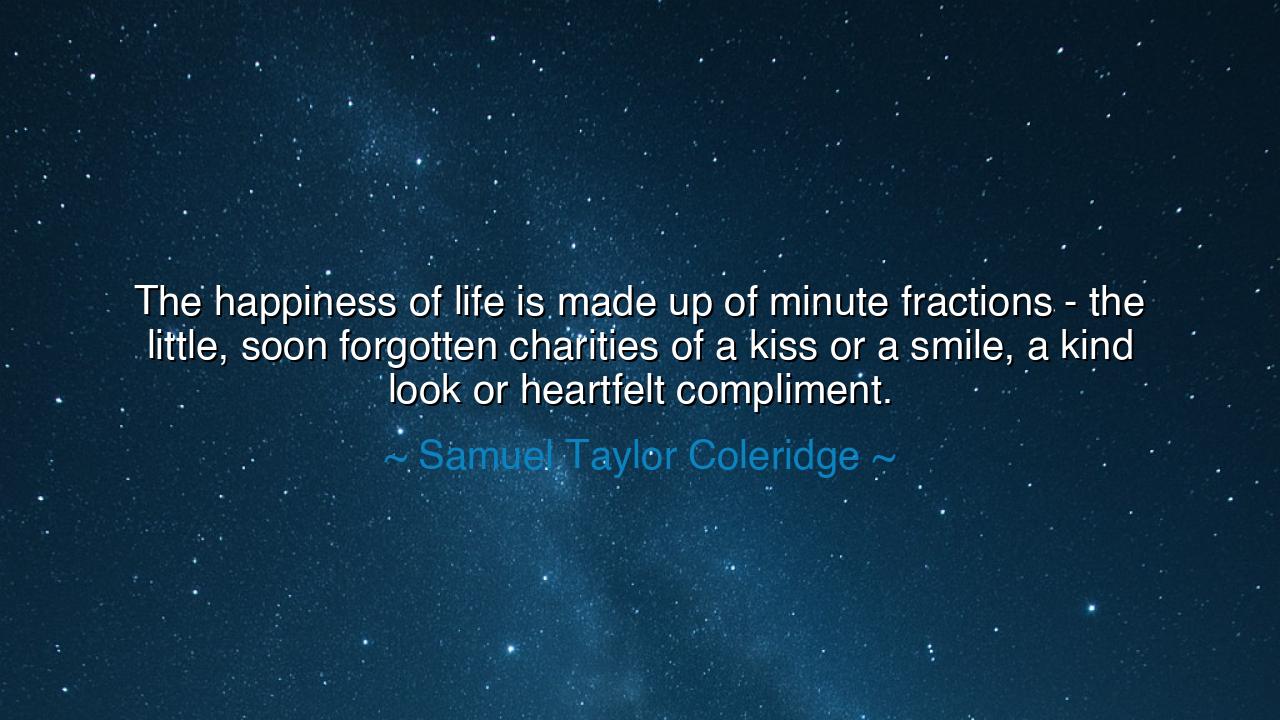
The happiness of life is made up of minute fractions - the
The happiness of life is made up of minute fractions - the little, soon forgotten charities of a kiss or a smile, a kind look or heartfelt compliment.






"The happiness of life is made up of minute fractions — the little, soon forgotten charities of a kiss or a smile, a kind look or heartfelt compliment." — Samuel Taylor Coleridge
Thus spoke Samuel Taylor Coleridge, the poet of vision and spirit, whose words carried the quiet strength of one who had seen both the heights of imagination and the depths of despair. In this reflection, he draws our attention not to the grand gestures or monumental triumphs that so often dazzle the world, but to the minute fractions — the small, gentle acts of love that form the true fabric of happiness. His words are a reminder that the soul’s joy is not born of wealth or fame, but of the kindnesses exchanged in passing, the smiles, the heartfelt compliments, the unrecorded mercies that ripple through time unseen yet eternal.
Coleridge lived in an age of great intellect and turmoil. A philosopher, poet, and dreamer, he wrestled with illness and melancholy, seeking meaning in both divine truth and human tenderness. It was in such reflection that he realized a profound truth: life’s happiness is not a single, shining crown, but a mosaic of small mercies. The great moments of victory are rare and fleeting, but the gentle gestures — a reassuring touch, a sincere word, a moment of shared laughter — these are the daily miracles that sustain the human spirit. They may be soon forgotten, as he says, yet they leave invisible imprints upon the heart.
There is divine power in simplicity. Just as a single drop of water reflects the sun, a single act of kindness reflects the light of love itself. The “charities of a kiss or a smile” are the world’s quiet salvation, for they remind each soul that it is seen, valued, and loved. The philosopher may chase knowledge, the warrior may seek glory, but the one who gives warmth to another human heart holds the true key to contentment. The ancients knew this well. Marcus Aurelius, emperor and stoic, wrote that the soul is brightened by benevolence, that the greatest joy comes not from taking but from giving. Coleridge echoes this eternal law — that happiness is not possessed, but shared, and that the smallest gesture can carry infinite grace.
Consider, then, the story of Florence Nightingale, the Lady with the Lamp. In the Crimean War, surrounded by suffering and death, she walked the dark corridors of hospitals carrying nothing but a lantern and compassion. Her patients — soldiers broken by pain — did not remember speeches or grand miracles, but the gentle kindness of her presence: the light, the touch, the smile that reminded them they were not forgotten. Those minute fractions — her nightly visits, her whispered prayers — healed more hearts than medicine could. It was not her fame but her tenderness that made her immortal in memory.
Coleridge’s wisdom, therefore, is not merely poetic — it is moral, spiritual, and practical. It calls us to awareness — to the recognition that happiness is always within our reach, waiting in the smallest of moments. We chase after great joy as though it lies beyond mountains, but it often rests in the kind look we offer a stranger, in the gratitude we express to a friend, in the affection we show our family. These “small charities” are the building blocks of peace, and though they may vanish from memory, they remain alive in the soul, shaping who we are and how we are remembered.
The tragedy of modern life is that many seek happiness in the vast and forget the small. We measure joy in numbers, success in possessions, love in words shouted rather than whispered. But the world’s truest joy, as Coleridge teaches, lives in fractions — in the unnoticed acts that pass between hearts like sunlight through leaves. The smile costs nothing yet enriches both giver and receiver. The compliment that lifts another soul becomes a blessing returned a hundredfold. These are the eternal currencies of love, the treasures that never fade.
So, my listener, take this teaching as a lamp for your own journey. Do not wait for grand occasions to feel or to give happiness. Begin with what lies within your power — a smile, a kind word, a moment of sincere attention. Practice these minute charities, and you will find that your life, once scattered and restless, begins to glow with quiet purpose. Seek no applause, for true joy requires none. It is enough to have made one heart lighter, one day brighter, one soul less lonely.
For in the end, as Samuel Taylor Coleridge reminds us, happiness is not a monument built in a day, but a thousand humble stones laid with love. The kiss, the smile, the kind look — these are the sacred acts that make heaven visible on earth. Cherish them, and you will find that even the briefest kindness carries the weight of eternity.






AAdministratorAdministrator
Welcome, honored guests. Please leave a comment, we will respond soon